This fall, EDLR welcomes a number of visiting faculty members and also announces several new appointments for current members of the community. Read the Neag School of Education’s story.
Danielle DeRosa
Courses and Curriculum: EDLR 5105
UConn’s Department of Educational Leadership (EDLR) offers a rich and diverse curriculum that prepares both undergraduate and graduate students to be educational leaders in our ever-changing world. The “Courses and Curriculum” series highlights innovative courses within EDLR’s catalog that are changing the education game for the better.
The Department of Educational Leadership’s (EDLR) master’s program in Higher Education and Student Affairs (HESA) boasts a robust curriculum that prepares students to be well-rounded and reflective student affairs practitioners. EDLR 5105: Structured Group Dialogue in Student Affairs is both an innovative and integral part of the HESA curriculum, giving students a space to consider how dialogue, and intergroup dialogue specifically, can be a tool to explore their own racial identity and socialization, as well as the identities and processes of socialization of others. Students in the course are continually asked to reflect on the personal, professional, and educational implications of their learning. These insights and processes help the students learn how to dialogue with others who have varying perspectives given their own identities and socialization– a much-needed process on college campuses today.
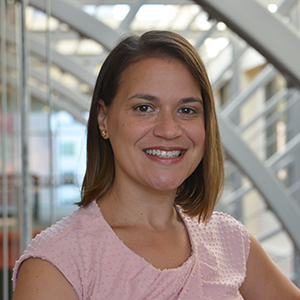
Students in EDLR 5105 engage in dialogue with each other as an entire class as well as in smaller, intra-class groups. One of the major aspects of the course is the Intergroup Collaboration Project (ICP), which, as the closing project for the course, encourages action as a result of learning. Students work alongside their cohort members in assigned groups to create visual representations of their learning, specifically around race and intergroup dialogue in student affairs practice. Through the ICP projects, students dialogue across differences to arrive at an understanding of that year’s selected theme: in 2016, the theme was “allyship;” in 2017 it was “social responsibility;” and in 2018 it was “disrupting race talk.” These visual representations are then shared with the larger UConn community in the form of a HESA Gallery Walk, which engages the larger UConn community in dialogue about race and higher education.
The course is co-taught by Dr. Milagros Castillo-Montoya (she/her/hers) and Danielle DeRosa (she/her/hers). It was Castillo-Montoya who lead the charge several years ago to update HESA’s existing groups-based course. As part of her research on teaching in higher education, she had begun to explore intergroup dialogue, and in the winter of 2015 she was part of a six-person UConn delegation that attended the University of Michigan’s intergroup dialogue training program. Upon her return, she worked with the department chair to incorporate her valuable training into the course, which was first offered in its renovated form in the fall of 2016. The course, which follows the University of Michigan model, is co-taught by design: its two instructors have different social identities which are aligned with focus of the course. In UConn HESA’s case, the central focus of the course is race.
The course is divided into four phases: Forming and Building Relationships, Exploring Differences and Commonalities of Experience, Exploring and Dialoguing About Contentious Issues, and Alliance Building and Social Responsibility. In each phase, says DeRosa, students are both learners and teachers: “My favorite part of teaching this course is learning with and from our students. Students in the HESA program think deeply about the ways in which college campuses can be more inclusive. As a community, we are each able to contribute from our own unique perspectives and lived experiences.”
Castillo-Montoya reaffirms the importance of bringing one’s unique identities and experiences to the course. “My lived experience as a Latina, first-generation college graduate from a low-income background informs my teaching of this course. So does my research expertise in teaching and learning in higher education,” says Castillo-Montoya. “From these experiences, I understand that the content of the course isn’t something ‘out there’ to be learned; it is inside each of us as we unpack our own assumptions and understandings about ourselves, others, and society relative to race. Then we can consider how those things impact our practice”
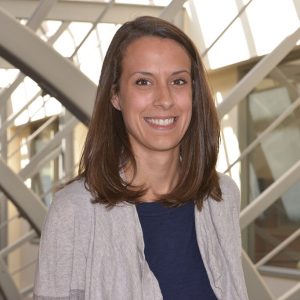
For DeRosa, her experience working with Husky Sport, a campus-community partnership between UConn and a community in the North End of Hartford, has been important to her ability to complexly and responsibly co-teach this course. “I have had to examine my own positionality as a white woman engaged in work in a neighborhood mostly comprised of people of color. I’ve had to do a lot of the work that we are asking our students to do in the course, and this is work that I continue to invest in; the process of learning about and unlearning our own socialization never ends. It can be helpful to share the journey of understanding my own racial identity as I connect with students.”
Kayla Moses (she/her/hers, HESA ‘20), a student in the course this past fall, says she has learned a great deal about the impact of socialization and the power of her identity. “Within the context of this course, I became more aware of how the world around us, along with our personal stories, can impact the way that we think and develop,” says Moses. “I became more aware of my position as a woman of color and how that has affected my learning. This course allowed me to not only expand my understanding of how my identity can help me relate to my current and future students of color, but also to realize that sharing the load with white peers and colleagues is the only way that this work can be done effectively.”
Fellow student Steven Feldman (he/him/his, HESA ‘20) says that the course opened his eyes to important differences between one-on-one and group dialogue. “In one-on-one conversations, it is more difficult to avoid or disengage from conversations about race, but in group conversations, it is easier to fall into racialized scripts of behavior,” says Feldman. “When this happens, white folks like me tend to stay silent either because we do not feel like we have the tools to talk about race yet or because we are experiencing the discomfort of talking about race. This course challenged me to reflect on my identities and consider the consequences of my words and behaviors in group contexts.”
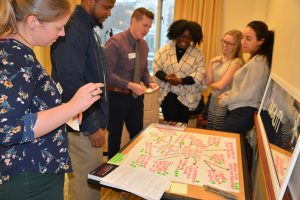
Castillo-Montoya and DeRosa, who just completed their third year teaching this course together, say it was their best co-teaching semester yet. Along with several of their students, they recently presented on the course at the 2019 ACPA (College Student Educators International) Annual Convention in Boston, Massachusetts. “Having this course makes UConn HESA one of only a handful of programs in the country that includes education on intergroup dialogue as part of their curriculum for future higher education and student affairs practitioners,” says Castillo-Montoya. “Practitioners in the field are increasingly competent in social justice and inclusion, and we want our graduates to be well prepared for their work with diverse students on diverse college campuses.”
“EDLR as a department has supported the development of this course from the outset,” says department head Dr. Jennifer McGarry. “We sent several faculty members to participate in the intergroup dialogue training at the University of Michigan, supported time and space to share about that experience, and encouraged the faculty who took part to integrate their learning with other opportunities to study, participate in, and lead dialogue about race. EDLR is committed to the course, the instructors, and the students: we see this teaching and learning as integral to who we are and what we value.” EDLR 5105 aligns with the Department of Educational Leadership’s mission to “inspire and cultivate innovative leaders for positive change” and Neag’s mission to develop leaders dedicated to improving education for all. The Department of Educational Leadership is proud to have talented teachers such as Dr. Milagros Castillo-Montoya and Danielle DeRosa doing the important work of opening and deepening dialogue on college campuses and beyond.
Welcoming Dr. Jane Nguyen for the Empower Women Through Sports Initiative
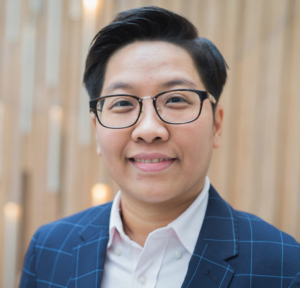
Each year, the U.S. Department of State, the Center for Sport, Peace & Society at the University of Tennessee Knoxville, and espnW co-sponsor the Global Sports Mentoring Program’s (GSMP) Empower Women Through Sports. This is an international leadership development initiative that recognizes female achievement in sport, and aims to empower women to be ambassadors of change for female athletes around the world. The initiative is based on evidence that women and girls who are exposed to sport increase their chances of success both on the field and in other areas of their lives.
“When women and girls can walk on the playing field, they are more likely to step into the classroom, the boardroom, and step out as leaders in society.”
-U.S. Department of State’s Bureau of Educational and Cultural Affairs
This year GSMP is partnering 15 emerging female leaders from 14 countries with leading executives and experts in the U.S. sports industry. We are excited to announce that the Department of Educational Leadership’s Laura Burton, Danielle DeRosa and Jennifer McGarry were selected to serve as mentors to an emerging leader from Vietnam, Dr. Tra Giang “Jane” Nguyen. This is DeRosa’s second year as a program mentor, while both Burton and McGarry will be serving as mentors for the third year in a row. The Department welcomed Dr. Nguyen on October 5th and will host her until October 24th.
Dr. Nguyen’s passion for sport began at a young age as she excelled as a top youth table tennis player. However, her achievements in sport would grow beyond her success as an athlete. After earning a bachelor’s degree in Physical Education, she moved to Thailand to pursue her M.S. and Ph.D. in Exercise and Sport Management from Burapha University. During her studies she was exposed to Sport Management and Psychology for the first time, which prompted her to create the first non-physical sport curriculum when she returned to Vietnam – including courses in sport management, marketing, economics, and tourism.
In her current role as a professor with the Institute of Sport Science and Technology at the University of Sport Ho Chi Minh City in Vietnam, Dr. Nguyen bridges the theories she teaches in the classroom with real-world experience – often inviting her students to assist her in coordinating major sport conferences and other events throughout the year. In 2017, Jane organized the International Conference on Sport Management, the first university sport conference ever held in Vietnam with more than 200 professors representing 28 countries.
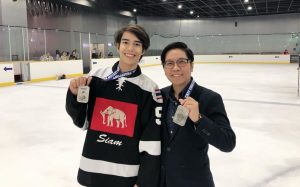
In addition to her university work, Dr. Nguyen served as general manager for Thailand’s men’s and women’s national ice hockey teams at the 2017 Asian Games in Japan where the men won the gold medal. She also managed the team during the 2017 Southeast Asian Games in Malaysia where the men won the silver medal. She currently works within the association to secure funding to run ice hockey camps for girls and women.
Dr. Nguyen is also currently working on a major project inspired by her time with Sport for Tomorrow, an initiative led by the Japanese government. Specifically her project titled, “Walk and Run for Tomorrow” will consist of a marathon and other racing events for students with and without disabilities in Ho Chi Minh City.
In her featured GSMP emerging leader profile, she explains “In Southeast Asian countries, we are very patriarchal. Women never have time to exercise or think about sports. That is why I work with students. I want to change the mindset in Vietnam so that women can participate in sports. And I want to show people it isn’t only physical education; sport can make the lives of all people better.” Although there are barriers for women to participate in sport, Jane sees her role as an advocate in this regard.
“We are so pleased to continue our involvement in this exciting and meaningful program. GSMP has has such a positive impact on the lives of girls and women around the world, and we lucky to play a role in support of the program. Dr. Nguyen is a natural ‘fit’ with us here at UConn, as she teaches and supports students in sport management at her university, while also seeking to positively impact the lives of girls and women through sport and physical activity.”
-Dr. Laura Burton, UConn Sport Management Professor and GSMP Mentor
Throughout the month, Dr. Nguyen will be spending time with Sport Management faculty at UConn to learn more about the context of sport in the U.S., non-profit development and social entrepreneurship, and gender and leadership development in sport. To share the GSMP mission more broadly with the UConn community, the Sport Management Program will host Dr. Sarah Hillyer, Director of the Center for Sport, Peace & Society at the University of Tennessee Knoxville, to talk about empowerment through sport on October 11, 2018. This event will be a part of the Beyond the Field Speaker Series, and is free and open to the public.
To date, GSMP has graduated 99 delegates who have gone on to impact 225,000 lives in more than 55 countries. Our department is fortunate to have had the opportunity to mentor delegates and be a part of this change. We look forward to continuing to carry out this mission, and are excited to welcome Dr. Nguyen this year!
Learn more through this featured GSMP video or visit the U.S. Department of State’s GSMP website. Or, check out GSMP on Facebook.